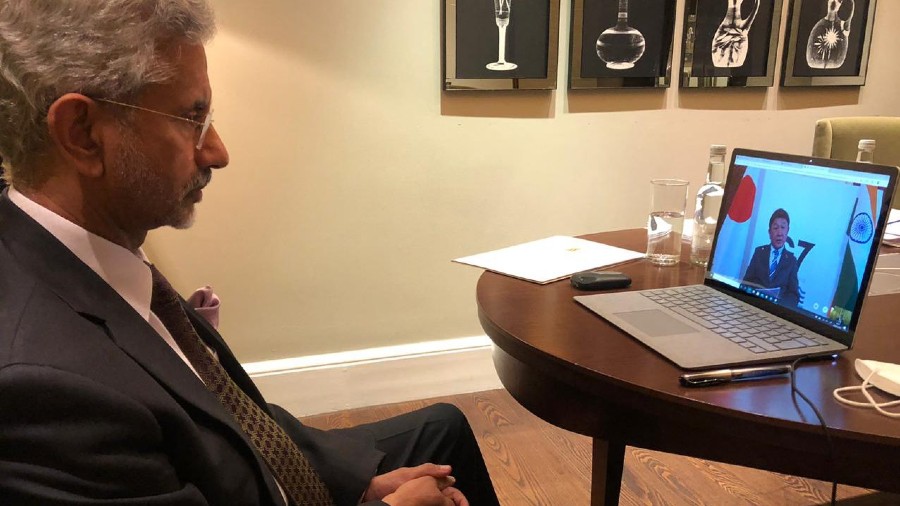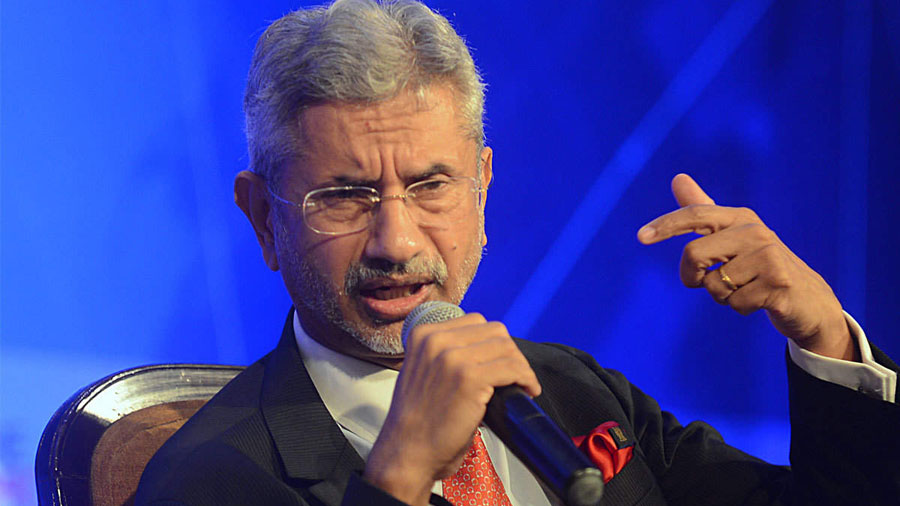Subrahmanyam Jaishankar’s guest delegation to the G7 meeting of foreign ministers in London made national news — for all the wrong reasons — when it was forced to go into isolation after two of its members tested positive for Covid-19.
“It’s very embarrassing,” commented a source at the hotel where the delegation is staying. “Maybe they caught it on the flight coming to London — that is why they are tested two days after arrival.”
“The Guardian understands all of the entourage tested negative before departing for the UK, but further tests on arrival conducted by Public Health England (PHE) showed two members had Covid,” the paper revealed.
It added: “It means all face-to-face meetings between the Indian ministers and their counterparts from Britain, Canada, France, Germany, Italy, Japan and the US have been cancelled and will take place virtually instead.
“They had been due to attend a session with the G7 on Wednesday at Lancaster House. Questions remain about whether the Indian delegates quarantined in a hotel on arrival in the UK, as required for travellers from ‘red list’ countries. Government guidance says there is an exemption for people representing a foreign country.”
It also said: “The UK home secretary, Priti Patel, tweeted a picture on Tuesday evening of her meeting India’s foreign affairs minister, Dr S. Jaishankar, with the pair both wearing masks.
“It is understood PHE advised Patel she did not need to isolate because social distancing and mask-wearing were maintained. Liz Truss, the international trade secretary, also held a meeting with Jaishankar but it was done virtually.”
News of the Indian delegation featured prominently on Radio 4’s World at One when David Adams, diplomatic correspondent, Paul Adams, provided millions of listeners chapter and verse: “India’s Foreign Minister Subrahmanyam Jaishankar says he was first made aware of the Covid outbreak in his own delegation last night. Out of consideration for others he tweeted he had decided to conduct his engagements in virtual mode.
“That’ll include a meeting this afternoon with Boris Johnson. It’s understood the junior officials who tested positive were in the room during meetings with the Home Secretary Priti Patel and the US Secretary of State Antony Blinken. The Indian delegation as a whole has yet to attend any meetings at Lancaster house, where the bulk of this G7 gatherings business has been conducted.
“Officials from Public Health England have said the risk to other delegates is low. The global pandemic is top of the agenda this afternoon. Former Prime Minister Gordon Brown is urging the world’s richest countries to do much more to ensure vaccines are available across the globe. No big pledges are expected today. But the spectacle of an Indian team having to self isolate while the issue is being discussed, is a reminder of why all this matters.”
In an extended interview, the programme’s presenter, Sarah Montague, put it to David Nabarro, special envoy on Covid-19: “India, of course, is feeling the heat at the moment. Should Prime Minister Narendra Modi impose a nationwide lockdown now?”
The response from Nabarro was nuanced: “I have seen a number of world experts and a number of Indian experts saying the only way to deal with the surging Covid in India is to impose very strict movement restrictions. But that was what was done last year in India in July when the numbers started to build up and then into August.
“And the problem with that lockdown was that it really did provoke incredible suffering — because poor people living in the cash economy, poor people who are in the informal sector, just don’t do well during lockdowns. And so I can quite understand that the Indian government will say, ‘We’d like to do everything possible to get on top of this pandemic, without having to impose a strict lockdown because of the consequences for so many of our citizens.’ And I sense that that is the very difficult political choice that the Prime Minister of India is having to take.”
Montague asked: “Do you think there are other parts of the world that are going to see what India is currently going through or perhaps even worse?”
Nabarro said: “This pandemic is fearsome, and it’s accelerating faster than ever. And it’s a global phenomenon. Yes, there are a few countries that are able to demonstrate that they’ve got much lower levels of disease, and they’re actually feeling that they’re recovering.
“But the majority of the world is heading into a very, very dark period.”
“And the reason why it’s particularly dark is that now we don’t have the full data, because more and more, the pandemic is spreading in places where testing is not available. So the numbers that we have we know are a major underestimate. It’s bigger than ever. It’s fiercer than ever. And it’s causing more distress than ever. This is a bad phase.”
He added: “I am expecting other parts of the world to experience surges of the kind that we’re seeing in not just India, but countries in the South Asia region. It may not be quite as horrible in terms of the extent of suffering, but it is going to be building up and surging in many different parts of the world. That is inevitable. And this virus is also changing. It’s mutating, and variants are appearing. And so I want everybody to be aware, it’s just one virus, but it’s an evolving virus. And that’s why I want continued care and attention not just from world leaders, but from everybody because it just has not gone away.”












